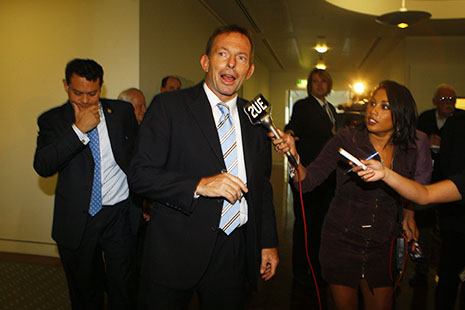TONY ABBOTT, the new federal opposition leader, has many admirable qualities. He is smart, hard working and energetic. He possesses true grit and, jokes aside, does have people skills. He is clearly defined in the electorate, in a quite endearing way, and runs a good line in self-deprecation.
His negatives have also been well-canvassed: he’s on the far right of his party, let alone the electorate, he’s a little sneaky, he’s too religious for secular Australia, he’s very anti-abortion. He can lack discipline. But there’s more to his problems than that.
Among politics watchers there is a belief that leaders need to have that certain something: pizzazz, charisma, call it what you will. In fact, the opposite is closer to the truth: it is better to be boring than unorthodox. This particularly applies to opposition leaders who wish to make the transition to prime minister. They should not set the pulse racing. They should be calming. Abbott is not calming.
There used to be a truism, seldom heard since Kevin Rudd’s 2007 victory, that opposition leaders should be well-known in the electorate, preferably household names, over many years. Abbott’s problem is that he is well known. There is too much definition there. His personal beliefs, particularly on abortion, are out there, and while voters probably admire him for sticking to them, it does make him scary. And, without wishing to resort to caricature, he carries in the popular mind a whiff of medievalism: people reckon he might be in Opus Dei, for example.
Abortion and morality – and personal behaviour more generally – are not issues Australians want their politicians to meddle in. Abbott can swear off them daily between now and the election, but it is already too late because people associate him with these things.
Abbott attracts in the media that clunkiest of labels, the “conviction politician.” It doesn’t matter that the label is wrong (he has repeatedly shown himself to be as politically expedient as anyone) but it does matter that this is how he is seen. And it’s not a good thing in an opposition leader.
The last person the phrase was applied to was Mark Latham. It made voters admire him, but it made him scary too. It is the opposite of what attracts votes at an Australian ballot box. An opposition leader who voters believe will stick to his or her guns, against all advice, is a troubling one. The main job of an opposition leader is to minimise the perception of risk.
There are other similarities between Latham and Abbott. Both surprise elevations to the leadership represented victories for the backbench and branches against the front bench. Both men, previously political warriors, embody muscularity, complication and conflict.
The Liberals’ decision to run against the emissions trading scheme is simply a tactical error. Malcolm Turnbull was right, it should be neutralised. The theory put by Barnaby Joyce and Wilson Tuckey is that opposing the ETS, by pointing out how much it will cost families, will make the government the issue. They think they can generate a massive scare campaign. But it is difficult for oppositions to run scare campaigns, because governments are all but impossible to portray as, well, scary.
And by behaving with such unorthodoxy it’s the opposition that will invite scrutiny. Abbott’s line that the Coalition believes in global warming but not in this particular response is likely to be contradicted frequently by his own side, because we know that many (indeed most, according to Nick Minchin) in the Liberal party room don’t believe in human-made global warming at all. Other Liberals firmly wish to see action taken against climate change, and opinion polls are likely to continue to favour the government. These are fertile conditions for public outbreaks of disunity.
Whether this combination will lead to a much larger defeat than would otherwise have been, or simply make a likely large defeat even more likely, we can’t know. But it is true what they say: the Liberal Party does not handle opposition well. In this case they have taken leave of their senses.
But there was good news for them in Tuesday’s party vote. Tales of a party split or even demise are exaggerated. In dreary but sturdy modern two-party systems you don’t get rid of one major party that easily. Institutional inertia ensures a zero sum game, and when people tire of this Labor government they will turn to the Liberals and Nationals – provided they are led by someone electable.
The Coalition was almost certainly going to lose the 2010 election anyway, and this week’s developments have made it unlikely that Abbott will be leader when, in 2013 perhaps, the time is ripe for a change of government. Joe Hockey, for example, a highly electable commodity, has narrowly avoided leading his party to defeat and so seeing his political career trashed (as Turnbull’s is). He will be available for another day.
So in the long term this was probably a good week for the Liberal Party. And Hockey. •





